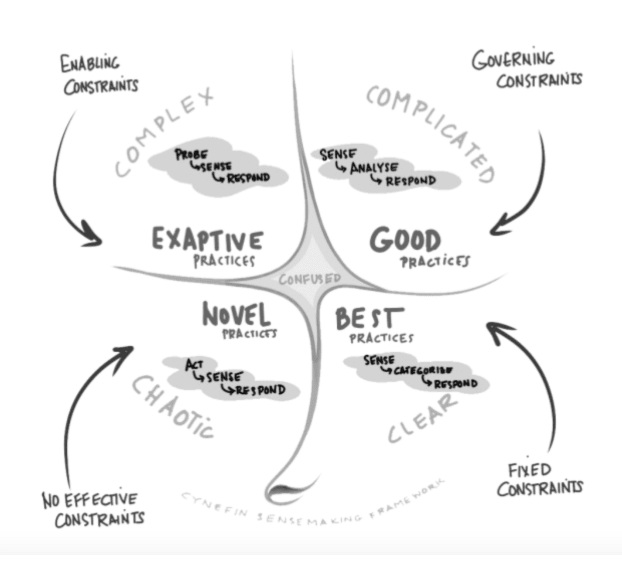Project vs Product Management:
the tension that underpins digital transformations
In large corporate businesses going through a digital transformation (and which large business isnt?), there is often a quiet (or loud) struggle between the ‘old world’ and the ‘new’. I.e. the ‘old way’ of doing things in the ‘business’ and the ‘new’ agile ways of working in tech.
I dont believe that ‘business’ people dont want to be agile and work in ‘new’ ways. In fact, many business people are inherently agile. However, there is a natural tension between ‘project management’ and building products.
The Cynefin Framework explains this well:

What this framework does is classify problems into types. Knowing the type of problem faced helps with understanding how to solve it (e.g. as a project or in a product/agile way).
Let me explain. Cynefin classifies 4 types of problems:
Simple problems. These have a known way of solving them. The problem itself might be difficult e.g. setting up Amazon IAM access so that DataDog can log archives into an s3 bucket. But there is a best-practice way to solve it.
Complicated problems. Have more than one way to solve them, through several ‘good practices’. E.g. integrating Salesforce into your company (with lots of options to customise or integrate with other services).
Complex problems. Have undefined user needs and/or new or unknown ways to deliver against these needs. E.g. building a new app, launching a new proposition. Unlike implementing Salesforce, we cannot say what success looks like at the start because the exact solution is unknown.
Chaotic problems. No defined needs or ways to address. This can essentially be ignored for the purposes of talking about digital delivery (although perhaps in some businesses it feels we created chaotic problems out of complex ones…)
Project vs Product Management
Simple problems do not require any governance.
Complicated problems, although far from easy have a clear step-by-step plan and the challenge is to make achieving the plan as efficient and effective as possible. They therefore lend themselves well to project management. Project managers can clearly define tasks to be done, approximate effort and track and manage against this.
Complex problems require a different approach because it is not possible to define the required tasks/steps to achieve the solution upfront. Product managers are able to manage uncertainty by working in agile ways - delivering ideas/features as fast as possible, testing/validating these and then moving on. The product is developed in increments so that learnings are incrementally built upon.
I believe much of the tension between business and tech teams comes from a confusion on how to solve a problem. Perhaps we could help each other by instead focussing on the type of problem to solve and agreeing the best way to solve and govern it.
